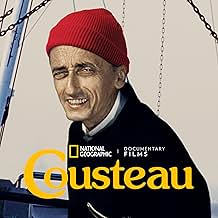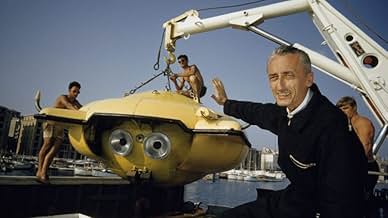AVALIAÇÃO DA IMDb
7,1/10
1,6 mil
SUA AVALIAÇÃO
Um olhar sobre a vida, paixões, realizações e tragédias em torno do famoso explorador e ambientalista Jacques Cousteau, com filmagens de arquivo recentemente restauradas.Um olhar sobre a vida, paixões, realizações e tragédias em torno do famoso explorador e ambientalista Jacques Cousteau, com filmagens de arquivo recentemente restauradas.Um olhar sobre a vida, paixões, realizações e tragédias em torno do famoso explorador e ambientalista Jacques Cousteau, com filmagens de arquivo recentemente restauradas.
- Indicado para 1 prêmio BAFTA
- 2 vitórias e 13 indicações no total
Fotos
Vincent Cassel
- Self - Narrator
- (narração)
Carol Burnett
- Self
- (cenas de arquivo)
Louis Malle
- Self
- (cenas de arquivo)
George Bush
- Self
- (cenas de arquivo)
Deborah Norville
- Self
- (cenas de arquivo)
Fidel Castro
- Self
- (cenas de arquivo)
Jacques-Yves Cousteau
- Self
- (cenas de arquivo)
Pablo Picasso
- Self
- (cenas de arquivo)
David L. Wolper
- Self
- (cenas de arquivo)
Jean-Michel Cousteau
- Self
- (cenas de arquivo)
Philippe Cousteau
- Self
- (cenas de arquivo)
Simone Cousteau
- Self
- (cenas de arquivo)
Jacques Renoir
- Self
- (narração)
Albert Falco
- Self
- (cenas de arquivo)
- (narração)
François Sarano
- Self
- (narração)
Philippe Tailliez
- Self
- (cenas de arquivo)
- (narração)
Yves Paccalet
- Self
- (narração)
- Direção
- Roteiristas
- Elenco e equipe completos
- Produção, bilheteria e muito mais no IMDbPro
Enredo
Você sabia?
- ConexõesFeatured in AniMat's Crazy Cartoon Cast: The Rat of All My Dreams (2020)
- Trilhas sonorasThe Cousteau Odyssey: Clipperton, The Island Time Forgot
(Music in part from)
Music Composed and Conducted by John Scott
Performed by The Royal Philharmonic Orchestra
Courtesy of PeeJay Music (ASCAP, PRS) and JOS Records
Avaliação em destaque
Greetings again from the darkness. For anyone under age 35, it may be difficult to imagine a world where high-definition cameras don't blanket every nook and cranny of our planet. These days, there are multiple channels serving up nature and oceanic documentaries, many with stunningly clear and colorful underwater photography. Each of these owe a debt of gratitude to Jacques-Yves Cousteau, and documentarian Liz Garbus is here to make sure we all know it.
Jacques Cousteau trained as a Navy pilot, but a serious accident drove him to swimming as therapy for his broken body. It's there where he became enamored with free-diving and spear-fishing, and Ms. Garbus includes some archival video clips to show those early days. He was soon driven to dive deeper and stay under longer, which led him to co-invent the regulator for Aqua-lung, the early device that eventually allowed for scuba diving and breathing underwater. His co-inventor happened to be the father of his wife Simone, whom he married in 1937. Simone, along with their two sons, spent a great deal of time on the Calypso. The crew referred to her as "The Sheperdess".
This unique underwater access meant Cousteau and his cohorts could perform research never before imagined. Soon they had re-commissioned a boat as "Calypso" and turned documenting the sea into their mission. Cousteau's love of cinema meant that he had to develop a camera that would function underwater so he could film all activities. In fact, it's Cousteau's own video archives that make up much of the clips used by Ms. Garbus here. In 1956, Cousteau and young French filmmaker, Louis Malle, finished their film, THE SILENT WORLD, and the underwater photography was so groundbreaking that the film won the prestigious Palm d'Or at Cannes, and the Oscar for Best Documentary. Cousteau claimed his films were not documentaries, but rather "true action stories". Malle, of course, went on to direct such acclaimed films as ELEVATOR TO THE GALLOWS (1958), ATLANTIC CITY (1980), and Au Revoir les Enfants (1987).
Ms. Garbus does a nice job of chronicling Cousteau's work, and for the many of us who were dedicated followers of his TV series, "The Undersea World of Jacques Cousteau", that red stocking cap remains a familiar visual. Actor Vincent Cassel reads passages from Cousteau's journals, and we learn that "Diving is the most fabulous distraction you can imagine", and that he was "miserable" out of the water. This matters because he transformed from delivering spell-binding underwater photography to an activist and educator, trying to make the world understand how humanity was destroying the ecosystem and what that meant to our world. All of today's discourse on the topic was indeed started by Cousteau, who proclaimed, "You protect what you love." Liz Garbus is one of our most talented documentarians, as evidenced by her work in such films as WHAT HAPPENED, MISS SIMONE, 2015 and THE FARM: ANGOLA, USA, 1998, and ALL IN: THE FIGHT FOR DEMOCRACY, 2020. The first two earned her Oscar nominations, and here she pays tribute to Jacques Cousteau - an explorer, researcher, filmmaker, and activist. She focuses on his professional life, and also touches on his tangled personal life - one that resulted in two additional kids (producers of this film) with Francine (while he was married to Simone), one of the divers on Calypso. We learn of the tragedy in Cousteau's life, and that he and his crew discovered the oil in the Persian Gulf while raising funds for their expeditions. Cousteau is shown at the Earth Summit in 1992, where he is treated as an international rock star. Ms. Garbus' film shows how Cousteau's work helped educate us as he tried to make the world a better place, by giving us an appreciation of the underwater world he so treasured.
Opening in theaters on October 22, 2021.
Jacques Cousteau trained as a Navy pilot, but a serious accident drove him to swimming as therapy for his broken body. It's there where he became enamored with free-diving and spear-fishing, and Ms. Garbus includes some archival video clips to show those early days. He was soon driven to dive deeper and stay under longer, which led him to co-invent the regulator for Aqua-lung, the early device that eventually allowed for scuba diving and breathing underwater. His co-inventor happened to be the father of his wife Simone, whom he married in 1937. Simone, along with their two sons, spent a great deal of time on the Calypso. The crew referred to her as "The Sheperdess".
This unique underwater access meant Cousteau and his cohorts could perform research never before imagined. Soon they had re-commissioned a boat as "Calypso" and turned documenting the sea into their mission. Cousteau's love of cinema meant that he had to develop a camera that would function underwater so he could film all activities. In fact, it's Cousteau's own video archives that make up much of the clips used by Ms. Garbus here. In 1956, Cousteau and young French filmmaker, Louis Malle, finished their film, THE SILENT WORLD, and the underwater photography was so groundbreaking that the film won the prestigious Palm d'Or at Cannes, and the Oscar for Best Documentary. Cousteau claimed his films were not documentaries, but rather "true action stories". Malle, of course, went on to direct such acclaimed films as ELEVATOR TO THE GALLOWS (1958), ATLANTIC CITY (1980), and Au Revoir les Enfants (1987).
Ms. Garbus does a nice job of chronicling Cousteau's work, and for the many of us who were dedicated followers of his TV series, "The Undersea World of Jacques Cousteau", that red stocking cap remains a familiar visual. Actor Vincent Cassel reads passages from Cousteau's journals, and we learn that "Diving is the most fabulous distraction you can imagine", and that he was "miserable" out of the water. This matters because he transformed from delivering spell-binding underwater photography to an activist and educator, trying to make the world understand how humanity was destroying the ecosystem and what that meant to our world. All of today's discourse on the topic was indeed started by Cousteau, who proclaimed, "You protect what you love." Liz Garbus is one of our most talented documentarians, as evidenced by her work in such films as WHAT HAPPENED, MISS SIMONE, 2015 and THE FARM: ANGOLA, USA, 1998, and ALL IN: THE FIGHT FOR DEMOCRACY, 2020. The first two earned her Oscar nominations, and here she pays tribute to Jacques Cousteau - an explorer, researcher, filmmaker, and activist. She focuses on his professional life, and also touches on his tangled personal life - one that resulted in two additional kids (producers of this film) with Francine (while he was married to Simone), one of the divers on Calypso. We learn of the tragedy in Cousteau's life, and that he and his crew discovered the oil in the Persian Gulf while raising funds for their expeditions. Cousteau is shown at the Earth Summit in 1992, where he is treated as an international rock star. Ms. Garbus' film shows how Cousteau's work helped educate us as he tried to make the world a better place, by giving us an appreciation of the underwater world he so treasured.
Opening in theaters on October 22, 2021.
- ferguson-6
- 20 de out. de 2021
- Link permanente
Principais escolhas
Faça login para avaliar e ver a lista de recomendações personalizadas
- How long is Becoming Cousteau?Fornecido pela Alexa
Detalhes
- Data de lançamento
- País de origem
- Central de atendimento oficial
- Idiomas
- Também conhecido como
- Cousteau
- Locações de filme
- Empresas de produção
- Consulte mais créditos da empresa na IMDbPro
Bilheteria
- Faturamento bruto nos EUA e Canadá
- US$ 231.687
- Fim de semana de estreia nos EUA e Canadá
- US$ 116.974
- 24 de out. de 2021
- Faturamento bruto mundial
- US$ 282.634
- Tempo de duração1 hora 34 minutos
- Cor
- Mixagem de som
- Proporção
- 1.85 : 1
Contribua para esta página
Sugerir uma alteração ou adicionar conteúdo ausente

Principal brecha
By what name was Becoming Cousteau (2021) officially released in Canada in French?
Responda


























